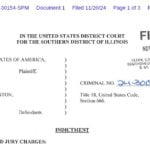Pecatonica Township (ECWd) –
This is an examination of a township’s powers, or lack thereof, to enact a Resolution banning certain people from attending meetings and banning people from township property.
First and foremost, Dillon’s Rule applies to Townships as it does to all other non home rule units of local government. Dillon’s Rule is the basic principle that a unit of local government only possesses those powers granted it by the legislature or by the constitution, and those power necessary and indispensable to those granted. In other words; look for specific authorizations to do something, not for a specific prohibition against doing it, as the rule is the action is prohibited unless authorized, and silence is a prohibition.
Dillon’s Rule applies to Townships, and like all other non-home-rule units, Townships have no inherent powers, only those granted to them by the constitution or authorized by statute. Diversified Computer Servs. v. York, 104 Ill. App. 3d 852, 60 Ill. Dec. 684, 433
N.E.2d 726, 1982 Ill. App. (Ill. App. Ct. 2d Dist. 1982).
Do people have a statutory right to attend public meetings? Yes.
- The Open Meetings Act declares that the policy of the State of Illinois that “its citizens shall be given . . . the right to attend all meetings. . .” and that exceptions to the public’s right to attend exist only in those limited circumstances where the General Assembly has specifically determined (those exceptions are listed and must be strictly construed against closed meetings).
- In further declaration of the right to attend meetings, the Legislature has also stated that “any person shall be permitted an opportunity to address public officials under the rules established and recorded by the public body” – any such rules must enhance, and not further restrict, the public’s right to speak. Pecatonica’s rules have been declared unreasonable at least twice by the Attorney General (read them here).
Can a Township establish rules and regulations on the use of its buildings and properties? Yes (with exceptions).
- The Township Board? No!: Nothing in the Township Code authorizes a township board to make any rules or regulations governing the regulation and/or use of township property. (remember Dillon’s Rule?)
- The Electors are the only ones granted the authority to make rules and regulations (see 60 ILCS 1/30-190) governing the powers granted to electors,
- The Electors “may make all orders for the . . . regulation, or use of the township’s corporate property. . .” and “The electors may delegate the power to purchase, sell, or lease property to the township board for a period of up to 12 months. . .” (See 60 ILCS 1/30-50). Please note that the power to regulate the use of township property cannot be delegated to the township board.
- The Electors “may take all necessary measures and give directions for the exercise of their corporate powers” (See 60 ILCS 1/30-25). There is no language in the Township Code granting this power to the township board.
Can a Township ban anyone from a meeting? Yes and No.
- During an Annual Meeting of the Electors, the Moderator may ask any person disrupting the meeting to leave, or they may on Order of the Moderator be escorted out of the meeting by a police officer or another appointed person, and confined in a convenient place until the meeting is over. If they refused to leave when asked, they shall also forfeit the sum of $10 to the township when sued by the township. (See 60 ILCS 1/40-25). The Township Code contains no other language for removal or banishment from a township meeting (remember Dillon’s Rule?) – which means that power was never granted to a township except during a meeting of the electors.
- The Township Board was never, under any law, granted the power to remove or banish anyone from a public meeting.
Must Township Regulations and Rules be published? Yes.
- The Township Clerk shall cause all rules and regulations to be published within 20 days after their adoption by posting them in three public places in the town and by being inserted once in a newspaper published in the town. . .
How can a Township legally prohibit meeting attendance?
- By filing a civil suit asking a court to issue an injunction against a particular person or persons, or asking a court to issue a protective order against a person or persons from attending meetings of the township. There is no other legal way to banish a person form a public meeting – Ordinances or Regulations may certainly be adopted, but adopting an Ordinance or Resolution does not make that Ordinance or Resolution compliant with state law.
The above information lays out the argument that a Township lacks appropriate authority to ban or prohibit anyone from township property or from township meetings. That power was never granted to them by the legislature or the constitution. Only the Electors possess that specific power, and that power cannot be delegated to the township board.
This also means that any purported arrest and charges of “criminal trespass to state-supported property” based on any adopted (and illegal) Resolution cannot stand the test of law if there was no power granted to a township board or its supervisor to prohibit or ban a person from township property or township meetings.
Update: The Illinois Constitution, Article 1, Section V, provides that “The People have the right to assemble in a peaceable manner, to consult for the common good, to make known their opinions to their representatives and to apply for redress of grievances.”
Our next article will discuss the purported Attorney General’s “letter.”
.








5 Comments
Dale Waso
Posted at 08:10h, 14 MarchThese elected individuals in Pecatonica are Tyrants. Who do these people think they are ? They knowfully practiced Tyranny on the public. Nazis !
Dave
Posted at 11:09h, 26 November“The Open Meetings Act declares that the policy of the State of Illinois that “its citizens shall be given . . . the right to attend all meetings. . .” and that exceptions to the public’s right to attend exist only in those limited circumstances where the General Assembly has specifically determined (those exceptions are listed and must be strictly construed against closed meetings).”
How can they NOT know that?? I have to assume they are subverting the law willfully.
Grandma
Posted at 09:25h, 27 NovemberMisguiding by the township attorney at the Township’s cost (paying the attorney to draft and type up resolutions)
A. Lincoln
Posted at 11:07h, 26 NovemberSo, based on the constitutional, statutory, and common law cited above, and Dillon’s Rule, it appears Supervisor Musso has only one choice left: ban Rogene Hamilton’s attendance from all Pecatonica Township’s meetings for life.
mark misiorowski
Posted at 10:49h, 26 NovemberSee also: The Illinois Constitution, Article I, Section V.
“The People have the right to assemble in a peaceable manner, to consult for the common good, to make known their opinions to their representatives and to apply for redress of grievances..”
Please share with the good PEOPLE of Pecatonica, Illinois.
Happy Thanksgiving